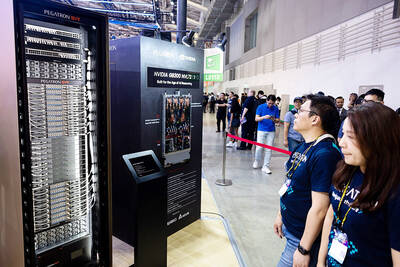KMT legislator Huang Hsien-chou (
The review comes on the heels of a new law that forbids car or motorcycle drivers from using hand-held cellphones while driving.
The new regulation, which went into effect on Sept. 1, was created in an effort to reduce car accidents caused by hand-held mobile phone use.
However, one mobile handset expert said the risks of having a car accident are still high as most drivers continue to talk on the phone while on the road using an earpiece plugged into the handset.
"Connecting a wired earpiece to a handset to answer phone calls is not safe driving," said Chang Ya-pin (
He explained that the wired headphones tend to be awkward and that the cord can get caught on a driver's arm and restrict motion.
"A well-qualified hands-free phone system should be wireless, have no voice feedback and be able to be answered automatically ... therefore, the car kit type system is the safest choice," Chang said.
A car kit mobile phone answering system often comes built into newer vehicles by manufacturers or can be purchased and plugged into a car's cigarette lighter.
After connecting mobile phones to the kit, calls will be answered automatically, while the stereo is switched off at the same time.
According to one kit manufacturer, most foreign automobile companies have integrated this system as a standard component in their vehicles.
"Therefore, if consumers purchase foreign vehicles manufactured after 1998, they can chose to have this equipment build in," said Tonny Chen (陳錫蒼), president of E-Lead Electronic Co Ltd (怡利電子), which supplies car companies such as Toyota and Mitsubishi.
There is a variety of hands-free mobile phone equipment on the market, and prices can be as low as NT$300 for a wired headphone or up to NT$3,000 for a car kit.
To get the most bang for your buck, Hitech Industrial Development Foundation's Chang suggests consumers purchase brand name accessories at auto chain stores rather than night market rip-offs. Chang added that after-market add-ons should cost between NT$1,000 to NT$1,200.

AI TALENT: No financial details were released about the deal, in which top Groq executives, including its CEO, would join Nvidia to help advance the technology Nvidia Corp has agreed to a licensing deal with artificial intelligence (AI) start-up Groq, furthering its investments in companies connected to the AI boom and gaining the right to add a new type of technology to its products. The world’s largest publicly traded company has paid for the right to use Groq’s technology and is to integrate its chip design into future products. Some of the start-up’s executives are leaving to join Nvidia to help with that effort, the companies said. Groq would continue as an independent company with a new chief executive, it said on Wednesday in a post on its Web

RESPONSE: The Japanese Ministry of Finance might have to intervene in the currency markets should the yen keep weakening toward the 160 level against the US dollar Japan’s chief currency official yesterday sent a warning on recent foreign exchange moves, after the yen weakened against the US dollar following Friday last week’s Bank of Japan (BOJ) decision. “We’re seeing one-directional, sudden moves especially after last week’s monetary policy meeting, so I’m deeply concerned,” Japanese Vice Finance Minister for International Affairs Atsushi Mimura told reporters. “We’d like to take appropriate responses against excessive moves.” The central bank on Friday raised its benchmark interest rate to the highest in 30 years, but Bank of Japan Governor Kazuo Ueda chose to keep his options open rather than bolster the yen,

Global server shipments are expected to surge to 15 million units next year, from 4 million units this year, with artificial intelligence (AI) servers accounting for about 30 percent, driven by massive capital spending by major cloud service providers, the Market Intelligence and Consulting Institute (MIC) said on Thursday last week. Major cloud service providers — including Google’s parent company Alphabet Inc, Microsoft Corp, Amazon.com Inc and Meta Platforms Inc — are projected to budget US$450 million for capital expenditure next year, up from US$400 million this year, MIC ICT [information and communications technology] Industry Research Center director Edward Lin

Even as the US is embarked on a bitter rivalry with China over the deployment of artificial intelligence (AI), Chinese technology is quietly making inroads into the US market. Despite considerable geopolitical tensions, Chinese open-source AI models are winning over a growing number of programmers and companies in the US. These are different from the closed generative AI models that have become household names — ChatGPT-maker OpenAI or Google’s Gemini — whose inner workings are fiercely protected. In contrast, “open” models offered by many Chinese rivals, from Alibaba (阿里巴巴) to DeepSeek (深度求索), allow programmers to customize parts of the software to suit their